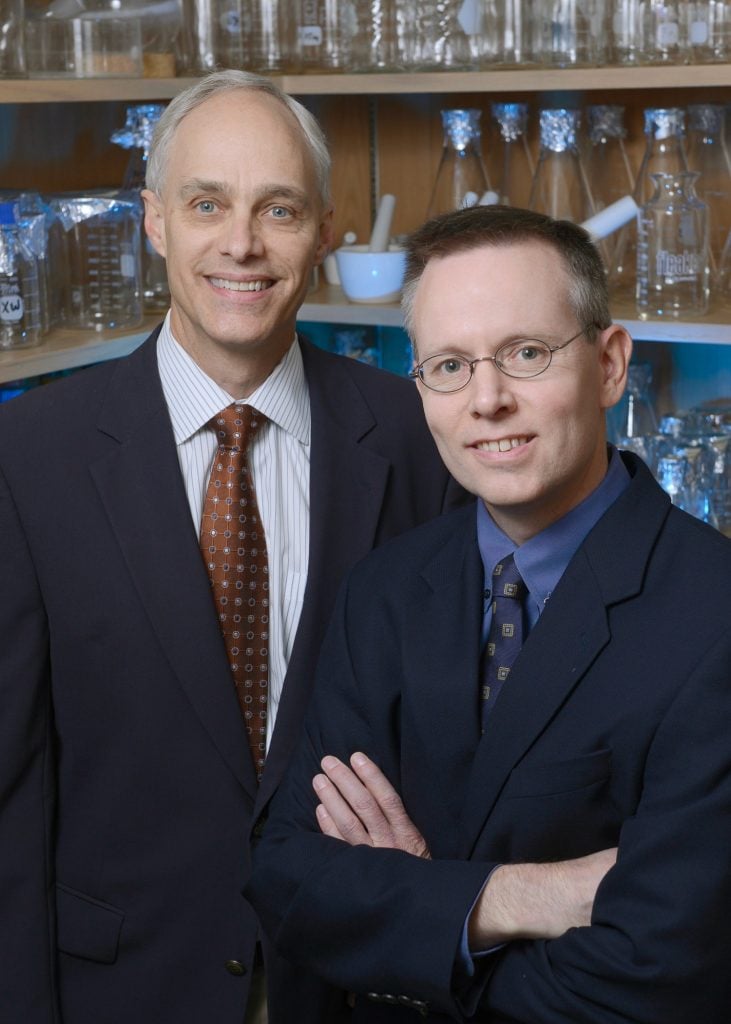
Recipients of the Endocrine Society’s 2025 Edwin B. Astwood Award for Outstanding Research in Basic Science, David Mangelsdorf, PhD, and Steven Kliewer, PhD, have spent a lot of time in the lab with drunken mice. Find out how these besotted rodents may hold the secrets behind the evolution of how fibroblast growth factor 21 might impact the liver-brain pathway and what led these researchers to endocrine science in the first place.
Last year, David Mangelsdorf, PhD, and Steven Kliewer, PhD, made headlines by getting mice drunk and then sobering them back up again. In a paper published in Cell Metabolism, Mangelsdorf, Kliewer, and their laboratory team found that fibroblast growth factor 21 (FGF21) protects mice against ethanol-induced loss of balance and righting reflex.
Previous studies had shown that FGF21 suppresses ethanol preference, induces water drinking to prevent dehydration, and protects against alcohol-induced liver injury, and their study showed that FGF21 plays a broader role in defending against the harmful consequences of ethanol exposure than previously thought.
The results suggested that the FGF21 liver-brain pathway evolved to protect against ethanol-induced intoxication. According to the authors, this pathway may modulate a variety of cognitive and emotional functions to enhance survival under stressful conditions.
“These results reveal a mechanism for selectively targeting noradrenergic neurons that could prove useful for treating both the loss of consciousness and impaired mobility that occur during acute alcohol poisoning,” Mangelsdorf, Kliewer, and their co-authors wrote in the conclusion.
This year, Mangelsdorf and Kliewer made headlines again, taking home the Endocrine Society’s Edwin B. Astwood Award for Outstanding Research in Basic Science, which recognizes individuals who have made significant contributions to the field of endocrinology via their outstanding basic science research.
Mangelsdorf, distinguished chair in molecular neuropharmacology and a Howard Hughes Medical Institute Investigator at University of Texas Southwestern Medical Center in Dallas, Texas, and Kliewer, distinguished chair in developmental biology at UT Southwestern Medical Center, have made groundbreaking discoveries in endocrine signaling through nuclear receptor research. Their discoveries include the elucidation of the key signaling pathways governing cholesterol, lipid, and bile acid homeostasis, the identification of a conserved mechanism controlling the way in which animals react to nutritional stress, and the characterization of the mechanism underlying parasitic nematode infections.
Endocrine News caught up with Mangelsdorf and Kliewer to hear how the entire lab reacted with “delight and surprise” when they heard the news of receiving the award, what led to their interest in endocrine signaling, and what’s next for them over the next few years.
Endocrine News: First off, congratulations on taking home the Edwin B. Astwood Award for Outstanding Research in Basic Science. How does it feel, and what does this award mean for your lab?
Mangelsdorf and Kliewer: For the two of us, it is a nice recognition of us as a team. For the lab, it is a wonderful appreciation of their hard work and achievements in scientific discovery.
EN: Tell us a little about yourselves. What led to your interest in science and medicine?
Mangelsdorf: For me, this was spurred by a biochemistry class that I took in college. In that class I had to pick a topic of my choosing to discuss, and the one I chose was on the biochemistry of cancer. It reset my career goals from initially wanting to be a marine biologist to the emerging fields of molecular biology and metabolism.
Kliewer: In college, I learned that I really enjoyed lab work and analyzing the resulting data. It made sense to pursue these interests in the context of the exciting new field of molecular biology.

“I became enamored with endocrinology as a postdoc … It became obvious that each of the orphan receptors represented an opportunity to discover a fundamental new signaling pathway. I decided then and there to become a hormone hunter!” — Steven Kliewer, PhD, distinguished chair in developmental biology, UT Southwestern Medical Center, Dallas, Texas
EN: From there, what led to your interest in endocrine signaling, especially in the two pathways your lab focuses on – nuclear hormone receptors and endocrine fibroblast growth factors?
Mangelsdorf: My interests stemmed from my graduate student thesis project cloning the vitamin D receptor, which we showed was a member of the newly revealed family of nuclear receptors. That led to postdoctoral work in Ron Evans’ lab at the Salk Institute, where we discovered the first of several orphan nuclear receptors. In our own independent labs, we went on to show that the downstream targets of two of those receptors (PPARalpha and FXR) were the endocrine growth factors, FGF19 and FGF21.
Kliewer: I became enamored with endocrinology as a postdoc in the Evans Lab. It became obvious that each of the orphan receptors represented an opportunity to discover a fundamental new signaling pathway. I decided then and there to become a hormone hunter!
EN: Your work has led to the discovery and creation of life-saving drugs that have had an incredible impact on human health. Can you talk about how that feels, and maybe share some of your findings you’re most excited about or proud of?
Mangelsdorf and Kliewer: The goal of our work has always been to ask the biggest question in the field and then follow where the science leads us. This type of discovery biology is often risky and requires one to leave their comfort zone. However, we have found that such research is fun and has an amazing way of providing unexpected insights that eventually lead to impacts on health and medicine. That is very rewarding.
EN: How many young researchers make up your laboratory team? What has been the most rewarding part of making discoveries with them?

“The goal of our work has always been to ask the biggest question in the field and then follow where the science leads us. This type of discovery biology is often risky and requires one to leave their comfort zone. However, we have found that such research is fun and has an amazing way of providing unexpected insights that eventually lead to impacts on health and medicine. That is very rewarding.” — David Mangelsdorf, PhD, distinguished chair in molecular neuropharmacology, University of Texas Southwestern Medical Center, Dallas, Texas
Mangelsdorf and Kliewer: We have a team of about 15 lab members. Watching their hard work pay off with a discovery is the most rewarding.
EN: What led to your joining the Endocrine Society? How has the Society helped with your work?
Mangelsdorf and Kliewer: The Endocrine Society has been our home since we were students. It has been quite fulfilling and appropriate that our careers have never wandered far from our roots in nuclear endocrine receptor biology.
EN: What’s next for your research, say over the next five years?
Mangelsdorf and Kliewer: We have two very active projects in the lab. The first continues to focus on the roles of FGF21 in governing the body’s response to alcohol. The second project really takes us back to our roots and centers on the discovery of a novel nuclear receptor pathway that controls nematode parasite lifecycles.
In his citation recommending Mangelsdorf and Kiewer for the 2025 Astwood Award, Donald McDonnell, PhD, the Glaxo-Wellcome Distinguished Professor of Molecular Cancer Biology, and professor of pharmacology and cancer biology, cell biology, and medicine in the School of Medicine at Duke University in Durham, N.C., remarked that “their work has led to the creation of life-saving drugs with FDA approval and impacted human health on a global scale,” McDonnell wrote, adding that Mangelsdorf and Kliewer separately pursued investigations into nuclear receptors and finally joined forces in 2002 when Kliewer was recruited to UT Southwestern, where Mangelsdorf had been doing research.
“Overall,” McDonnell continued, “their contributions have expanded our understanding of metabolic pathways, physiological regulators, and potential therapeutic interventions, demonstrating immense potential for human health, agricultural applications, and beyond.”
Bagley is the senior editor of Endocrine News. In the October issue he wrote about the potential viability of a male contraception gel.

